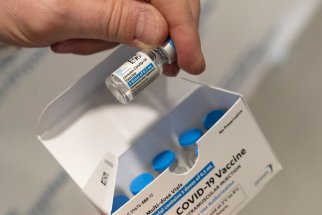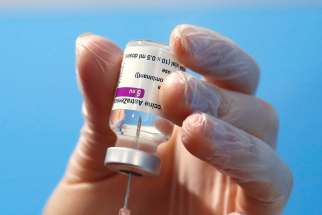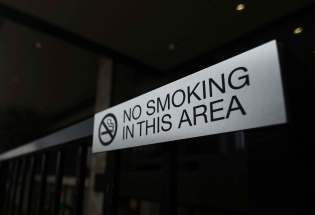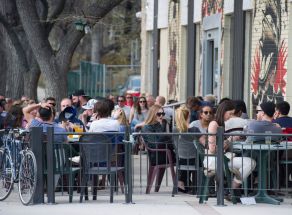Vaccination isn’t a pass for risky behaviour
Read this article for free:
or
Already have an account? Log in here »
To continue reading, please subscribe:
Monthly Digital Subscription
$0 for the first 4 weeks*
- Enjoy unlimited reading on winnipegfreepress.com
- Read the E-Edition, our digital replica newspaper
- Access News Break, our award-winning app
- Play interactive puzzles
*No charge for 4 weeks then price increases to the regular rate of $19.00 plus GST every four weeks. Offer available to new and qualified returning subscribers only. Cancel any time.
Monthly Digital Subscription
$4.75/week*
- Enjoy unlimited reading on winnipegfreepress.com
- Read the E-Edition, our digital replica newspaper
- Access News Break, our award-winning app
- Play interactive puzzles
*Billed as $19 plus GST every four weeks. Cancel any time.
To continue reading, please subscribe:
Add Free Press access to your Brandon Sun subscription for only an additional
$1 for the first 4 weeks*
*Your next subscription payment will increase by $1.00 and you will be charged $16.99 plus GST for four weeks. After four weeks, your payment will increase to $23.99 plus GST every four weeks.
Read unlimited articles for free today:
or
Already have an account? Log in here »
Hey there, time traveller!
This article was published 05/03/2021 (1739 days ago), so information in it may no longer be current.
This week, millions of eyes around the world were focused on the United States Centers for Disease Control and Prevention, which was expected to deliver guidelines on what additional social and economic liberties might be granted to Americans who have been vaccinated against COVID-19.
It was supposed to be a watershed moment in the global pandemic fight, as many viewed the CDC’s guidelines as a possible blueprint for how all countries might manage restrictions as more people get access to the vaccines.
Unfortunately, it was not to be.
Word leaked midweek that the CDC had delayed the guidelines. Why the CDC balked is anyone’s guess, but several plausible theories emerged.
Some believe the guidelines were stopped at a political level to avoid any sense U.S. President Joe Biden supported the decision by Texas and Mississippi to lift mandatory mask mandates as the number of vaccinated citizens grew. After describing those decisions as “Neanderthal” thinking, we can safely assume Biden does not support ending mandatory mask orders.
Others believe the CDC pumped the brakes because the science on vaccine efficacy and whether vaccinated or recovered people can still spread the virus is still evolving.
Whatever the reason, the CDC’s hesitancy highlights our burning curiosity about what life will be like after we all get the jab, and what happens if we move too quickly to ease restrictions.
Politically, this is an issue fraught with danger, particularly in countries like the U.S. and Canada where state or provincial political leaders have the authority to defy federal public health advice. And, as we can see in places like Texas and Mississippi, political leaders are willing to make political decisions to end mask mandates even as the science is suggesting that we should keep our faces covered.
Indeed, while politicians are mulling a return to normal, scientists around the world are scrambling to determine whether a fully vaccinated person is still a threat to spread the novel coronavirus.
To this point in the pandemic, the gross majority of research has focused on how well the vaccine protects the person who gets it and when we might achieve some sort of vaccine-induced herd immunity; only now are researchers turning their attention to assessing the threat a vaccinated person may pose to someone who hasn’t been vaccinated.
We know that if a vaccine is described as 90 per cent effective, it means that 90 per cent of the people who are immunized are unlikely to contract COVID-19. But that doesn’t mean a vaccinated person cannot still serve as a carrier of the virus and transmit it to others. And researchers still do not have a definitive assessment of how long people who contracted COVID-19 and recovered will maintain their acquired immunity.
Indeed, while politicians are mulling a return to normal, scientists around the world are scrambling to determine whether a fully vaccinated person is still a threat to spread the novel coronavirus.
That is why the CDC and other national public health agencies are urging vaccinated people to continue wearing masks, both to protect the unvaccinated and to ensure that someone who has received an early iteration of vaccine does not succumb to a variant.
The scientific mystery that continues to shroud COVID-19 has, once again, created huge public policy challenges. At what point can we safely eliminate restrictions and how do we ensure that a partially vaccinated population doesn’t inadvertently throw us back into a third or fourth wave of infections?
There aren’t many countries that have vaccinated enough of their populations to even consider the widespread lifting of restrictions. However, in countries like Israel, the conflict between anticipation and public health is at full boil.
Israel secured its place as a vaccination leader when it struck a deal with Pfizer to trade detailed patient information for a robust supply of vaccine. In essence, Israel agreed to allow its citizens to participate in a nation-wide experiment to see if the Pfizer vaccine performed as well in real life as it had in earlier clinical trials.
The end result of that deal with Pfizer is that as of this week, 54 per cent of Israel’s nine million people had received at least one shot; 40 per cent have received two doses. Progress like that means Israel is arguably the first country to face the prospect of easing restrictions for vaccinated people.
There is so much pent up demand for normalcy that the mere act of vaccination is enough to open a potential flood of risky behaviour before we have finished a more comprehensive risk assessment.
In mid-February, the Israeli government started issuing a “green pass” to anyone who had completed their course of vaccinations. Although occupancy limits and mandatory masks are still the order of the day, anyone with a pass would be allowed to partake in a broader range of social and economic activities, including access to gyms, indoor dining, movie theatres and music venues.
But here’s the problem. As The Guardian newspaper reported in late February, many older people who have received a stamp in their green passes are already starting to show a tendency to stop wearing masks in crowded outdoor locations. And hotels are jammed with green-pass bearing guests who are pleasantly defiant about occupancy limits in cafés.
There is so much pent up demand for normalcy that the mere act of vaccination is enough to open a potential flood of risky behaviour before we have finished a more comprehensive risk assessment.
People often say that the “anticipation is killing me.” Most of us know, however, that it’s not the building anticipation of a return to normal that will kill us.
It’s our inability to hold that anticipation in check that continues to present the greatest threat.
dan.lett@freepress.mb.ca

Born and raised in and around Toronto, Dan Lett came to Winnipeg in 1986, less than a year out of journalism school with a lifelong dream to be a newspaper reporter.
Our newsroom depends on a growing audience of readers to power our journalism. If you are not a paid reader, please consider becoming a subscriber.
Our newsroom depends on its audience of readers to power our journalism. Thank you for your support.
History
Updated on Friday, March 5, 2021 7:40 PM CST: Removes photos as per editor.










